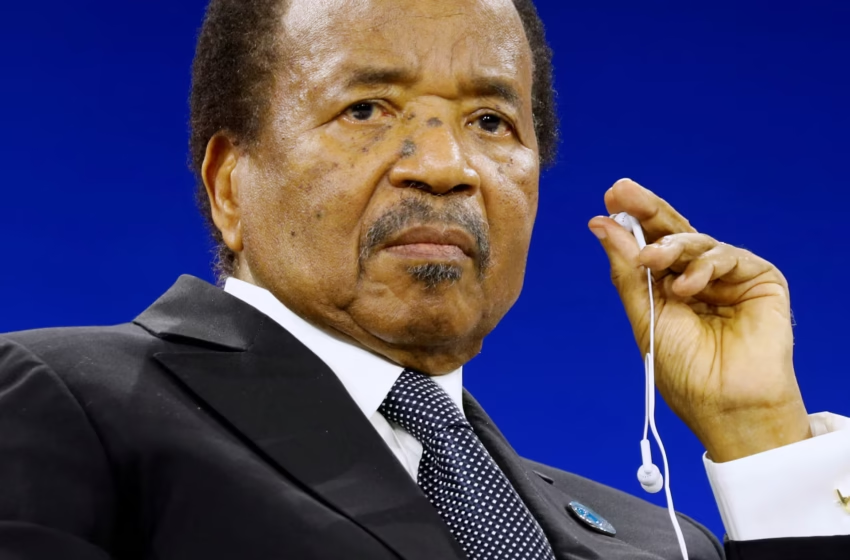Paul Biya: 10 things to know about world’s oldest president seeking re-election

At 92, Cameroon’s Paul Biya seeks an eighth term — meet the world’s oldest president and the controversies that follow him.
As Cameroon prepares for its 2025 presidential election, the world watches in disbelief as its long-serving president, Paul Biya, announces his bid for an eighth term—at the age of 92. Often referred to as the “absentee president,” Biya is not just a symbol of continuity in Cameroonian politics but also a reflection of Africa’s enduring relationship with long-term leadership.
This feature explores 10 interesting and, at times, unbelievable facts about the man who has outlasted nine American presidents in power and now holds the title of world’s oldest sitting head of state.
1. World’s Oldest Serving President
At 92, Paul Biya is officially the oldest sitting president in the world as of 2025. Born on February 13, 1933, his long life and extended political career make him a historic figure not only in Cameroon but globally. While many at his age enjoy retirement, Biya is preparing for yet another electoral campaign.
READ ALSO
Paul Biya: Cameroon’s 92-yr-old president seeks re-election — what this means for Africa
2. Over Four Decades in Power
Biya became President of Cameroon in 1982, succeeding the country’s first president, Ahmadou Ahidjo. As of 2025, he has been in power for 43 years, making him one of the longest-reigning leaders in modern history.
3. The “Absentee President” Reputation
One of the most controversial aspects of Biya’s presidency is his tendency to govern from abroad. Reports indicate that he has spent over four and a half years outside the country—mostly in Switzerland—during his time in office, raising questions about transparency, leadership, and accountability.
4. A French-Educated Technocrat
Biya was educated in France, where he attended prestigious institutions like the Institut des Hautes Études d’Outre-Mer and Sciences Po. He is fluent in French and English, mirroring Cameroon’s bilingual roots.
5. Term Limits? Removed.
In 2008, Cameroon’s constitution was amended under Biya’s influence to abolish presidential term limits, effectively granting him the legal right to seek re-election indefinitely. This decision cemented his status as a sit-tight leader and was met with both domestic and international criticism.
6. A Reserved Public Persona
Unlike more flamboyant leaders, Biya keeps a low public profile. He rarely addresses the media or engages in public debates, earning him a reputation as enigmatic and withdrawn. His silence during national crises often frustrates critics.
7. The First Lady’s Colorful Contrast
Paul Biya is married to Chantal Biya, who is known for her vibrant fashion, distinctive hairstyles, and high visibility at public functions. Their relationship has drawn attention due to their 38-year age difference, with Chantal becoming First Lady at age 23 in 1994.
8. Navigating Turbulent Times
Biya’s reign has been marked by significant challenges, including the Anglophone crisis, Islamist insurgency in the north, and increasing economic frustration. Despite these, he has consistently retained a firm grip on power.
9. Lavish Lifestyle Amid Corruption Allegations
International observers and watchdogs have frequently raised concerns about Biya’s lavish spending during trips abroad and corruption within his administration. Despite Cameroon’s struggles with poverty, Biya reportedly spends months at luxury hotels overseas.
10. Campaigning at 92 — “The Best Is Yet to Come”
In a recent social media post, Biya stunned the world by confirming he would run again in 2025, declaring: “The best is yet to come.” This optimistic message, coming from a man in his 90s, speaks volumes about his resolve—or perhaps his refusal—to relinquish power.
Paul Biya’s story is one of power, persistence, and paradox. At an age when most men are surrounded by grandchildren and memoirs, Biya is preparing for election posters and political rallies. Whether celebrated as a symbol of stability or condemned as a relic of authoritarian rule, his continued leadership highlights pressing questions about succession, democracy, and governance in Africa. As the continent evolves, so too must its leadership culture—starting with the question of when it’s time to let go.

